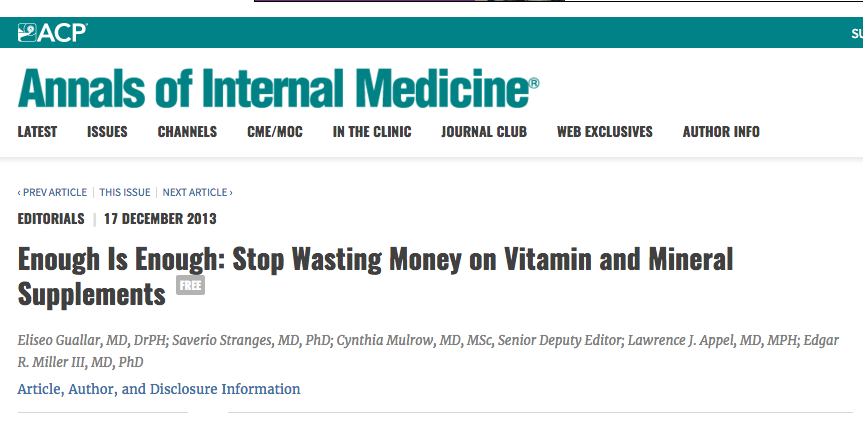In 2012, the Cochrane collaborative team evaluated all of the studies intended to evaluate the potential for antioxidant vitamins and mineral supplementation to prevent the progression of AMD. They evaluated 13 randomized, controlled trials, which included a sum total of 6,150 participants, including five trials in the U.S., two in the U.K., two in Austria, and one each in Australia, China, Italy, and Switzerland.
Cochrane’s final analysis: “The review of trials found that supplementation with antioxidants and zinc may be of modest benefit in people with AMD. This was mainly seen in one large trial [AREDS] that followed up participants for an average of six years. The other smaller trials with shorter follow-up do not provide evidence of any benefit.”46
They added: “Although generally regarded as safe, vitamin supplements may have harmful effects.”46
AERDS Trial
By 2012, the evidence for the benefit of synthetic vitamins, in terms of preventing the progression of AMD, wasn’t all that great. Out of the 13 trials that had attempted to address the hypothesis that antioxidant vitamins and minerals might help prevent the progression of AMD, primarily only one showed any benefit – and that was the AREDS (1) trial.
No doubt, the AREDS trial was by far the largest trial and the longest lasting. In that trial, essentially one of thirteen patients had a benefit in terms of preventing progression. This benefit only occurred in those with at least intermediate degrees of AMD or advanced AMD in one eye. Interestingly, the greater the degree of AMD at the beginning of the trial, the more likely they were to benefit from the antioxidants and zinc.
** I would like to thank colleague Ophthalmologist and Vitreo-Retinal Surgeon, Andrew J. Luff, M.A., M.B., B.S., FRCS, FRCOphth of the United Kingdom, for his assistance in the AREDS analysis and statistics in the previous category of this series, entitled: Do Synthetic Vitamins Slow the Progression of AMD?
AREDS supplements don’t prevent AMD, but are expected to prevent the progression of disease Is this a paradox?
I’ve addressed this issue in my book – and would like to mention it again here. AREDS vitamins, or multivitamin antioxidant and mineral supplementation, have not been shown to prevent AMD in any study. Yet, we expect them to help prevent the progression of AMD once the disease is moderate or severe. Is this logical? Or is this a paradox?
If these supplements cannot prevent the disease in the first place, why should we expect them to prevent the progression, once the disease is established?
Put on your logician’s hat, and think on that, if you would, and I’ll give my impression in the “Conclusion” of this article.
Synthetic multivitamin supplementation causes earlier demise: AERDS formula is a multivitamin.
Wait, but the sub-title above is just an attention grabber, right?
Wrong. The sub-title above is true – and unequivocally so.
In 2012, the Cochrane (independent) researchers analyzed 78 trials that involved a total of 296,707 participants who were randomized to either antioxidant supplements, which included vitamins A, C, and E, beta-carotene, and selenium, or placebo, or no intervention at all (not even placebo). Fifty-six of these trials had a “low risk of bias,” (e.g., those that were not funded by vitamin manufacturers) and included 244,056 participants. The investigators found that those people taking the multivitamin supplements were 1.04 times as likely to die as were the controls.47
In other words, the people consuming synthetic multivitamins were a little less healthy and likely to die a little sooner than those people not consuming synthetic multivitamin supplementation.
The Cochrane investigators wrote, in conclusion:
We found no evidence to support antioxidant supplements for primary or secondary prevention. Beta-carotene and vitamin E seem to increase mortality, and so may higher doses of vitamin A. Antioxidant supplements need to be considered as medicinal products and should undergo sufficient evaluation before marketing.47
Oh, but you might be thinking, “Well sure, but that’s just one study, right?” Nah, this is a meta-analysis of 78 trials. Seventy-eight. And it was completed by Cochrane – an entirely independent organization, with no bias, whose only intent is to provide scientifically-minded advice for our benefit.
In a small cross-sectional study in Australia, 100 patients with Grade 3 or 4 AMD who would ostensibly benefit from the AREDS formula (according to the AREDS Study), were interviewed to determine their knowledge and “compliance” with the regular consumption of the AREDS formula. It turns out that 53% of the participants were aware of the supplement, 38% were taking the supplement, and only 1% were taking the recommended dose (99% taking a smaller dose than recommended).48 Of the 53% who were aware of the supplement but not taking it, 31% cited cost as the main reason for not consuming the multivitamin. Another 31% were not taking the supplement either because of “actual side effects experienced, fear of potential side-effect and/or fear of interaction with other medications.”48
This means that just about two-thirds of people not taking the supplement were doing so either because they were too expensive, they had already had side effects, or they feared potential side effects or interactions with other medicines. This means a good percentage of people are beginning to recognize the inherent potential side-effects and potential dangers of supplements – and this was a study published in 2006.
In another small study completed by investigators at Penn State University, in Hershey, Pennsylvania, researchers interviewed 64 patients with AMD, of whom 63% met AREDS criteria for vitamin supplementation. Of those who met the criteria for the vitamin supplements, only 43% reported taking the AREDS vitamins in the recommended dosages.49 Interestingly, in this very small study, 75% of patients reported that “vitamin supplementation had never been recommended to them.”49
The latter statement might possibly suggest that ophthalmologists and/or optometrists are not convincingly recommending synthetic vitamin supplements to their AMD patients. Could this be?
As an anecdote from my own observations, I recall that, in December of 2014, when I was deep in the midst of investigating the hypothesis proffered herein (for the cause of AMD), I sat in a symposium for ophthalmologists at the University of Texas Southwestern Medical Center, among perhaps a couple of hundred ophthalmologists. Ron Klein, M.D., who is perhaps the U.S. expert on the epidemiology (incidence and prevalence of disease) of AMD, had just spoken and he was answering questions.
One ophthalmologist very directly asked Dr. Klein:
What do you really think of these AREDS formula supplements? Are they just snake oil?
And perhaps the most interesting thing to me wasn’t his question (or the answer) really, but rather, the audience’s response. Nobody in the audience made a peep. No one sighed, gestured, shook their head, or in any other way appeared to react as if his question wasn’t appropriate. I was taking full notice because I was about to begin a full-blown, full-time investigation into the cause of AMD that would forever change my life – and I had already begun to develop the previously mentioned hypothesis and analyze the nutritional basis of AMD.
And, in fact, I was already deeply convinced that antioxidant vitamins bore little – if any – benefit for AMD patients.
Quite frankly, I don’t think a soul in that room had ever witnessed an exceptionally good response to the AREDS formula of vitamins, but of course, this is pure speculation and conjecture on my part. I know that, in 24 years of ophthalmology, I never once saw a good reaction to the vitamin supplements. And quite honestly, I’ve never heard another ophthalmologist who has either.
Dr. Klein, of course, answered the doctor’s question, and with the usual… “Well, the AREDS formula did show that there was a 25% reduction… ” etc., etc.
Though I could fill the next five pages with reports on studies that have shown that synthetic supplements generally not only fail to provide their intended effects but that they also may have significant side effects, let me just mention the ones most appropriate to the AREDS study.
In the AREDS1 trial, 7.5% of patients consuming the synthetic supplement had an increased risk of hospital admission for bladder and kidney complications from the high doses of zinc.44
In the AREDS 2 trial, there were more than twice as many lung cancer cases in those receiving beta-carotene (23 patients) as in those who did not receive beta-carotene (11 patients). That is, in smokers and former smokers, 2% of those receiving beta-carotene developed lung cancer, versus just 0.9% of those not receiving beta-carotene, and this number was statistically significant (P = 0.04).50
In a meta-analysis completed by investigators at Johns Hopkins School of Medicine regarding vitamin E supplementation and all-cause mortality, a total of 19 trials were evaluated to determine the overall effect. These 19 trials included a total of 135,967 participants; nine trials tested vitamin E alone and the other 10 tested vitamin E in combination with other vitamins or minerals.
Their findings?
In the authors’ words:
In our meta-analysis, we identified a dose-dependent relationship between vitamin E supplementation and all-cause mortality. Specifically, all-cause mortality progressively increased for dosages approximately greater than 150 IU/d [International Units/Day].51
And in their conclusion, they specifically state, “High-dosage (≥ 400 IU/d) vitamin E supplements may increase all-cause mortality and should be avoided.”51
Perhaps I should remind you (and me), the AREDS formula, including the AREDS 2 Formula, contains 400 IU of vitamin E!
Although I am still trying to keep my promise to keep this related to the AREDS formula, I feel compelled to mention – for those who really want to know about synthetic vitamin consumption, health, and disease – just a couple of things…
In a paper published in the journal Lancet, the authors open the paper with the following statement: “In observational studies, antioxidant vitamins [consumed in food] have been inversely associated with cardiovascular disease, cancer, and all-cause mortality. However, well-conducted randomized controlled trials have shown that supplementation with antioxidants does not protect against these disorders.”51 (Italics added.)
For those still not convinced of the general lack of merit for such antioxidant vitamins in supplement form, I suggest watching two lectures, available online.
One of these lectures is by Howard Sesso, Sc.D., M.P.H., at the Harvard School of Public Health, entitled “Demystifying Nutrition – The Value of Food, Vitamins and Supplements.”53 This is a Longwood Seminar, held at Harvard Medical School, and reviews numerous studies on synthetic vitamins and other supplements. It is available on YouTube.
The second is a lecture by Jeffrey Tice, M.D., at the University of California San Francisco, Department of Medicine. This lecture is entitled “Vitamins and Supplements: An Evidence-Based Approach.”54 This lecture is also available on YouTube and links for both lectures are available in the referenced footnotes (linked here).
If you’ve generally been a fan of supplementation, I think all of this may change your tune.
And if it doesn’t, ask yourself if your current paradigm (and regimen) are properly benefitting you.
Alright, we’re making good progress. But, we’ve got a ways to go. The goal here is to leave no stone unturned. We want to know, for certain, that we’re doing the right thing, correct? How valuable is our vision? Is it not worth an intense investigation? I believe so. And I’m in this for you and your family, for me and my family, and for the more than 190 million other people in this world that are currently losing vision to AMD.
So let’s keep digging.
Macular Degeneration, AREDS Vitamins, and Genetics
So far, the findings have been pretty straightforward, right? With regard to macular degeneration, synthetically
derived vitamins (those in pills) don’t prevent AMD. But, they appear to help prevent the progression of disease for those who have moderate or advanced AMD in at least one eye, and overall, about one in thirteen patients has a benefit. Not too good, but better than nothing most would agree, right?
Now the plot thickens, the complexity elevates significantly, and the controversy begins.
Any researcher, science writer, or physician, who wants to teach, needs to try to take complex science or medical literature and make sense of it to those not in the field, right? Hopefully, I’ll do that as we deal with some complex genetics and AMD.
I will absolutely not exhaustively review the genetics versus vitamins and AMD research. I think it would overwhelm almost anyone, including ophthalmologists and optometrists (unless they’re just gluttons for punishment!). So, I will just try to summarize the most salient research, in order to make sense of the big picture in the next part of this series.
__________
See References Here.
_________
This is Part Four of an eight-part series.
Part 1: Are the Best Vitamins for Macular Degeneration Synthetic?
Part 2: The History of Vitamins
Part 3: Vitamins and AMD
Part 5: Coming soon
Part 6: Coming soon
Part 7:Coming soon
Part 8: Coming soon



